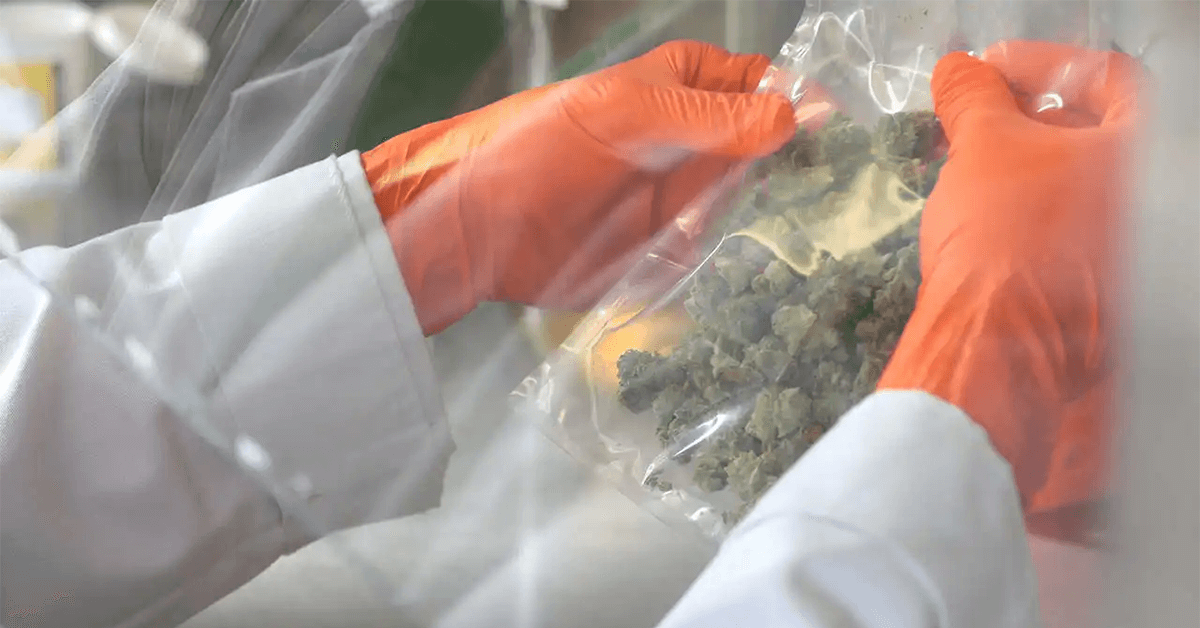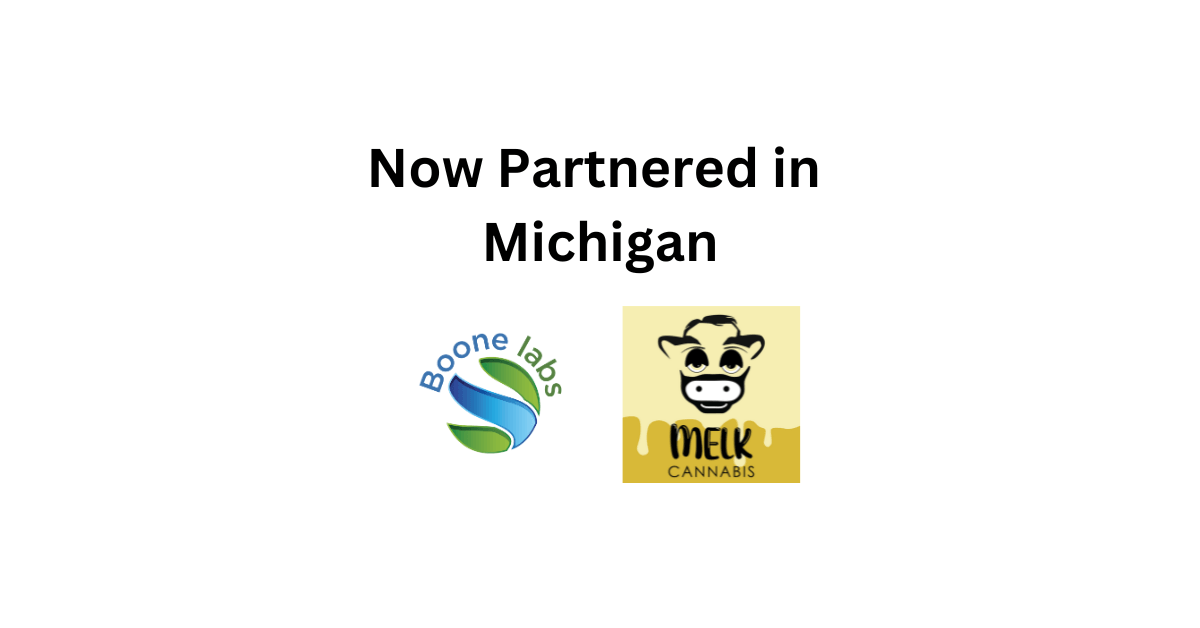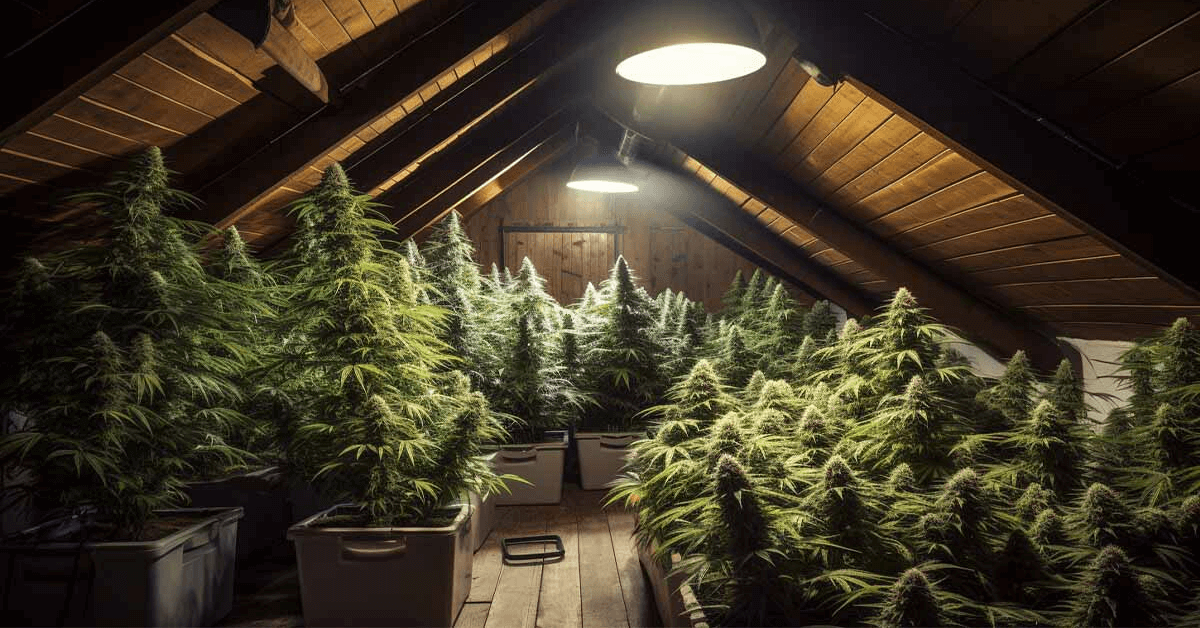Marijuana Disposal Practices Questioned After Discovery Near Homeless Camp

In a concerning discovery, over thirty bags with marijuana residue were recently found in a trash pile near a homeless encampment, raising questions about compliance with Michigan's cannabis disposal regulations and potential health risks for the local homeless population.
The site was inspected, uncovering the discarded bags, each marked with barcodes and unique license numbers linked to various marijuana businesses. These identifiers suggest that the bags originated from a testing facility, a critical step in ensuring the safety and quality of marijuana products in Michigan.
State laws mandate that both recreational and medical marijuana undergo rigorous testing by independent laboratories. These tests check for harmful contaminants, including mold, mildew, and toxic chemicals, to protect consumers' health. However, the discovery of these bags indicates a possible breach in the disposal process outlined by state regulations.
Mike Karl, a homeless advocate, highlighted a troubling aspect of this situation. He observed that the local unhoused community has been retrieving these bags from dumpsters. This act poses significant health risks, particularly if the marijuana residue contains harmful substances that were initially being tested for, such as powdery mildew or other chemicals. Karl expressed deep concern over the potential medical complications that could arise from the homeless population smoking or handling these discarded substances.
Michigan's Cannabis Regulatory Agency (CRA) has strict rules regarding the disposal of tested marijuana products. These rules stipulate that all samples must be rendered unrecognizable and completely destroyed before disposal. Non-compliance with these regulations can lead to severe fines and penalties. However, the exact source of these bags remains unclear, despite the visible names and license numbers of various dispensaries on them. A CRA spokesperson declined to comment on this specific incident.
The discovery of these marijuana residue bags not only raises questions about the adherence to state disposal guidelines by some businesses but also highlights a critical public health concern. Immediate action and investigation are necessary to prevent further risks to vulnerable populations and to ensure that all marijuana businesses comply with state regulations.
Financial Reshuffling in Michigan Cannabis: Comco Wellness Awaits New Ownership

Comco LLC, a cannabis company operating under the name Comco Wellness in Jackson, Michigan, is set to be auctioned following a court-mandated receivership process that has lasted nine months in the Jackson County Circuit Court.
The company's substantial assets are poised to be acquired by Bag Boys LLC, the designated stalking horse bidder. This entity is connected to Farm Marcellus, a marijuana cultivation company located approximately 30 miles southwest of Kalamazoo, which holds four Class C grow licenses.
Since August of the previous year, Farm Marcellus has been financially supporting Comco during its receivership. The company has proposed a bid of at least $1.9 million, aimed at settling creditor debts and securing ownership of Comco.
The specifics of the stalking horse bid include a cash payment of $1.031 million and an additional $862,000 allocated for creditor repayment over a 12-month period, as detailed in court documents.
David Dragich, the attorney representing the court-appointed receiver, Gene Kohut, noted that further details regarding the final purchase price are yet to be disclosed.
Additionally, Farm Marcellus plans to absolve the debt incurred by Comco during the receivership, estimated to be between $800,000 and $900,000, as per court records.
Under the proposed agreement, Bag Boys would acquire Comco's cultivation facility located at 12584 Wooden Road in Jonesville. This facility is equipped with four Class C licenses and a processor license. However, Comco's other property at 8891 Pulaski Road in Concord is not included in this bid and is expected to be sold separately, according to Dragich.
Interested parties have until February 16th to submit competing bids for Comco.
The company's entry into receivership in April of the previous year was precipitated by legal action from Anewsha Holding Group LLC, based in Puerto Rico, and New York's cannabis payment software firm, Fusion LLC, operating as LeafLink.
Anewsha claims that Comco and its real estate division, Byrson Enterprises—both under the ownership of attorney Peter Behncke—failed to repay loans and invoices exceeding $1.3 million.
Initially, in 2019, Comco and Bryson borrowed $1.35 million from Anewsha, with an 11.89% interest rate, due by October 31, 2022. However, by the fall of 2022, Comco defaulted on the loan and also accumulated overdue rent of at least $25,000 on its Jonesville property.
LeafLink's lawsuit alleges that Comco has approximately $5.6 million in unsettled invoices since February 2022.
The expected payments from Bag Boys or Farm Marcellus are anticipated to be directed primarily to Anewsha, a secured creditor, as opposed to the service provider, LeafLink, as stated by Dragich.
Michigan Court Rules Cannabis Company's Lawsuit Against Law Firm Filed Too Late

In a significant legal development in Michigan, an appellate court upheld a previous ruling dismissing a lawsuit filed by cannabis company Great Chicago Fire Inc. against law firm Dinsmore & Shohl LLP. The suit, alleging that Dinsmore missed the filing deadline for the company's Illinois cannabis dispensary licenses, was ruled as filed beyond the permissible time frame.
The crux of the lawsuit revolved around the company's claim that Dinsmore, hired in October 2019, failed to submit 10 dispensary license applications by the January 2nd, 2020, deadline. Great Chicago Fire Inc. contended that the law firm, overwhelmed with other clients, informed them less than two hours before the deadline, leaving them unassisted in the filing process.
When the company initiated legal action against Dinsmore and two of its attorneys in April 2022, it was more than two years past the application deadline. The lawsuit encompassed claims of breach of contract, legal malpractice, and tortious interference with a business expectancy.
However, the appellate court found that the alleged breach — Dinsmore's failure to file the applications — required action in Illinois. The panel referenced the Michigan borrowing statute, which mandates that cases involving out-of-state plaintiffs adhere to time limits set by both Michigan law and the law of the state where the action should have occurred.
The court highlighted that since the dispensary applications were to be filed in Illinois, the fact that the contract was drafted and signed in Michigan by a Michigan-based attorney did not bear significant relevance to the case. Furthermore, the panel noted that the plaintiff did not allege any breach related to the services provided by Dinsmore prior to the filing deadline.
Adding to the complexity, another attorney, who did not hold a Michigan law license and was not a signatory of the engagement agreement, had been involved in the case for several months, working from Ohio and Illinois.
This ruling came from a panel comprising Judges Michael F. Gadola, Christopher M. Murray, and Christopher P. Yates of the Michigan Court of Appeals. While representatives for the involved parties were not available for immediate comments, the case, Great Chicago Fire Inc. v. John D. Mackewich, case number 365666, has set a precedent in the intersection of legal services and the cannabis industry in Michigan.
Boone Labs Partners with Melk Cannabis to Enhance Michigan's Cannabis Industry

In a significant move within the Michigan cannabis sector, Boone Labs, a family-owned cannabis processing facility, has announced a strategic partnership with Melk Cannabis, a leader in premium solventless cannabis products. This collaboration is a merging of two family-founded entities aiming to set a new standard in quality, variety, and innovation in Michigan's regulated cannabis market.
Boone Labs, based in Buchanan, Michigan, has been a prominent figure in the industry, known for representing leading brands such as Kush Masters and Elevated Lakes. The partnership with Melk Cannabis, under the guidance of Nick Young, a cannabis industry expert with ten years of experience and a Marketing Professor at Western Michigan University, signals an exciting fusion of educational depth, seasoned expertise, and a shared passion for crafting premium cannabis products that appeal to consumers.
Melk Cannabis, driven by Young's visionary leadership, has gained a reputation for its superior solventless products. The brand stands out for its unique milk carton packaging and innovative approaches to cannabis consumption. With a commitment to quality and consumer preferences, Melk Cannabis has become a favored brand in Michigan's cannabis market.
This strategic partnership brings together Boone Labs' manufacturing excellence and Melk Cannabis' expertise in solventless cannabis production. The collaboration is set to provide retailers and consumers with an enhanced selection of high-quality solventless products, showcasing the combined strengths of Boone Labs, Kush Masters, Elevated Lakes, and Melk Cannabis.
Nick Young, the founder of Melk Cannabis, expresses his enthusiasm for the collaboration, viewing it as an opportunity to reinforce their commitment to providing enjoyable and solventless cannabis experiences. Similarly, Boone Labs is optimistic about the partnership, with Max Boone, the Director of Sales and Partnerships, emphasizing their shared goal to uplift the cannabis experience in Michigan by offering top-tier solventless products.
The partnership has already yielded results, with Boone and Melk producing a solventless concentrate batch that has successfully passed state testing and is ready for distribution. This collaboration not only signifies a growth in business operations for both Boone Labs and Melk Cannabis but also represents a promising step forward in elevating the standards and experiences for cannabis consumers in Michigan.
Exploring the Robust Growth of Michigan's Cannabis Industry in 2023

In 2023, Michigan's cannabis sector demonstrated significant expansion, with total marijuana product sales surpassing $3.06 billion, as reported by the state's Cannabis Regulatory Agency (CRA). This growth trajectory is expected to continue, according to industry experts.
Mid-lower Michigan, including Mecosta and Osceola counties, contributed notably to this success, recording sales exceeding $16 million in December alone. Tyler Dutcher, the owner of Vivid Farms, a grow facility in Barryton, foresees further industry growth, citing increasing consumer demand and innovative consumption methods.
Since Michigan legalized adult-use cannabis in November 2018, the industry has witnessed remarkable growth, with a 474% increase in sales from 2020 to 2023. Additionally, CRA data indicates a 78% reduction in the average price of flower since the early days of legalization, reflecting market growth and saturation.
Dutcher also highlighted the challenges and cyclic nature of the cannabis industry, noting that not all businesses are equipped to handle the industry's fluctuations. He mentioned the significant scale of operations, with some farms planting hundreds of thousands of plants, poised to become national leaders in cannabis cultivation.
A notable development in the industry is the formation of the 'Blacklist of MI Cannabis' Facebook group by Brandon Hauck and Kate Sikkila of Emerald Fire Farms. This initiative aims to address payment issues faced by growers, and it has already facilitated the settlement of numerous debts. The CRA has shown support for this effort by considering non-renewal of licenses for retail establishments that fail to pay their debts.
Chivonne Rush, a marketing representative from Timber Cannabis, reported successful growth for their Big Rapids location since its opening in January 2022. The company's expansion, including the launch of its sixth location in Mount Pleasant, reflects increasing societal acceptance and decreasing stigma surrounding cannabis.
Timber Cannabis focuses on product innovation and education, with Rush noting the popularity of products like infused pre-rolls and live rosin. The company collaborates with High Minded, a grow operation, to develop new strains and products. She emphasized the importance of community involvement for dispensaries and grow operations, as well as the potential for continued industry growth and the passion of new industry entrants.
Dutcher also commented on the diminishing viability of the Medical Marihuana Facilities Licensing Act in the face of recreational cannabis industry growth. He observed a trend of locations across Michigan adopting recreational ordinances, which often provide similar benefits to those of medical dispensaries but with a broader product selection.
According to Michigan Cannabis Information, the state boasts over a thousand CRA-licensed marijuana dispensary locations, including approximately 330 active medical marijuana dispensaries and over 660 active recreational cannabis shops.
Vassar Cannabis Center Penalized for Storing Marijuana in Attic

The Cannabis Regulatory Agency (CRA) has imposed significant penalties on 664 Vassar, LLC, operating as Premier Provisioning Center #2 in Vassar, Michigan, for multiple compliance violations. The regulatory action includes a substantial fine of $212,000 and a 30-day suspension of the facility's operations, effective from February 3rd through March 3rd, 2024.
During a compliance check on April 21st, 2022, CRA inspectors discovered several regulatory breaches at the facility. Key violations included:
- Storage of expired marijuana products, such as distillate carts, medicated syrup, gummies, and chocolates, in an unmonitored area within the facility (the attic).
- Discovery of 15 different strains of untagged marijuana flower stored inappropriately in a garbage bag, away from surveillance.
- Presence of untagged "house wax" in various forms, not under video surveillance.
- Mislabeling of approximately 38 jars and several sheets of house wax with the same tracking tag number.
- Improper storage of Round Up pesticide in proximity to marijuana products.
- Storage of hundreds of small jars of unregulated caregiver "house wax."
- Possession of untagged medicated syrup named 'Chill Medicated.'
In response to these findings, the CRA requested 30 days of video surveillance footage on April 22nd, 2022. However, 664 Vassar, LLC failed to provide fully functional footage, leaving the origins of the mentioned products untraceable.
To address these infractions, 664 Vassar, LLC is required to update and implement standard operating procedures (SOPs) within 40 days, covering various aspects of operation including the statewide monitoring system, sales, transfers, storage of marijuana products, and chemical storage. Additionally, the facility must conduct thorough training for all managers and employees on these SOPs, providing comprehensive documentation of the training process.
Furthermore, within 160 days, 664 Vassar, LLC is obligated to organize the destruction of all untagged marijuana products in the presence of a CRA staff member, alongside providing video evidence of compliant destruction. The facility is also required to conduct an inventory audit and report any discrepancies between physical inventory and the statewide monitoring system records.
This enforcement action underscores the CRA's commitment to maintaining regulatory compliance within Michigan's cannabis industry, ensuring safety and adherence to established standards.


 Helpful Links
Helpful Links